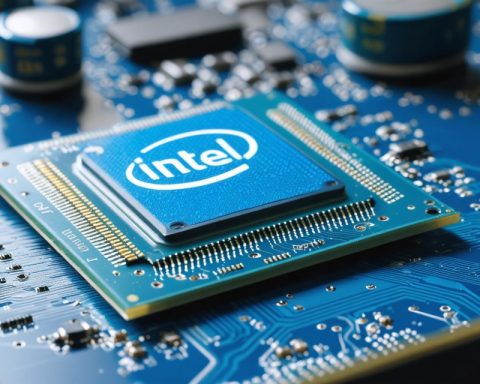- Daegu Department Store implemented an AI broadcasting system, reducing announcement time from 90 to 15 seconds.
- AI enhances the shopping experience by customizing background music based on weather and holidays.
- AI technology transforms retail in South Korea, impacting giants like Lotte, Shinsegae, and Hyundai.
- Lotte partners with Ocado to develop advanced AI logistics, and Seven-Eleven utilizes AI in store management.
- Intelligent systems manage inventory and predict sales trends across the retail sector.
- AI innovation is essential for the retail industry’s survival and adaptation to market changes.
In the bustling maze of Daegu’s department store, a simple tap on a smartphone and a mere whisper prompt a powerful chain of events. The store has embraced a new age where artificial intelligence, with a blink of brilliance, crafts and broadcasts announcements that would otherwise have tangled employees in procedural webs. This new AI broadcasting system, introduced at Daegu Department Store this month, shaves the traditionally lengthy process from a tedious minute and a half to a remarkable fifteen seconds.
Imagine AI not as a machine but as a conductor harmonizing the chaos of a busy marketplace, orchestrating everything from succinct announcements to mood-setting background scores. It tailors playlists based on the whims of weather or the grace of holidays, promising not just efficiency, but an experience. It’s more than convenience; it’s a savings symphony, where both time and resources find reprieve.
Across South Korea, the wave of AI innovation sweeps through, transforming retail giants like Lotte, Shinsegae, and Hyundai. These titans are turbocharging with AI-dedicated teams and cutting-edge logistics centers. Lotte allies with British tech company Ocado to cultivate advanced AI-driven logistics, while its convenience store, Seven-Eleven, integrates AI to redefine store management.
This technological renaissance isn’t confined to Daegu alone. It has woven itself into the fabric of nationwide retail, where intelligent systems manage inventory, predict sales trends, and print discount labels with AI-generated precision. For the retail sector, these advances aren’t just novel. They are, as industry insiders suggest, the very lifeline ensuring survival in an ever-evolving market. The message is clear: adapt to AI, or risk obsolescence.
The AI Revolution in Retail: Transforming Store Operations and Customer Experience
Embracing AI in Retail: How It Transforms Operations
The integration of AI in retail, as exemplified by Daegu Department Store, is revolutionizing operations in a multitude of ways. Here’s a breakdown of how AI is transforming retail operations and enhancing the customer experience:
How-To Steps & Life Hacks
1. Streamlining Announcements:
– Use voice recognition technology to draft and refine customer announcements in real time.
– Implement machine learning algorithms to automatically adjust messaging based on store conditions and customer flow.
2. Customizing Background Music:
– Deploy AI-driven playlist curators that select music aligning with customer demographics and seasonal changes.
– Adjust volume and track selection based on real-time shopper density.
3. Inventory and Logistics Management:
– Use predictive analytics to forecast product demand and optimize stock levels.
– Collaborate with logistics tech companies like Ocado for efficient supply chain management.
Real-World Use Cases
– Lotte’s AI-Enhanced Logistics: By partnering with Ocado, Lotte is pioneering AI in logistics, improving efficiency and reducing waste [Source: Business Korea].
– Seven-Eleven’s Smart Stores: AI is implemented for smart shelves and automated checkout systems, enhancing customer satisfaction and operational reliability.
Market Forecasts & Industry Trends
– AI in Retail Market Growth: The global AI in retail market is expected to reach USD 24.12 billion by 2027, growing at a CAGR of 34.9% from 2020 to 2027 [Source: MarketsandMarkets].
– Trends: Increased adoption of AI for personalized marketing and customer interaction, with emphasis on virtual shopping assistants and chatbot customer service.
Reviews & Comparisons
– AI Systems in Retail: Comparing AI solutions, such as IBM Watson Commerce, Google Cloud AI, and Microsoft’s Azure AI, each offers distinct benefits like NLP capabilities, advanced analytics, and seamless integration.
Controversies & Limitations
– Ethical Concerns: The use of AI may raise privacy issues, especially concerning data collection and analysis.
– Technology Dependence: Over-reliance on AI systems can lead to vulnerabilities in data breaches or system failures.
Security & Sustainability
– Data Security: Retailers are adopting robust cybersecurity measures tailored for AI applications to protect customer data.
– Sustainability Efforts: AI helps in minimizing surplus inventory and reducing carbon footprints through optimized delivery routes.
Pros & Cons Overview
– Pros:
– Increased efficiency
– Enhanced customer experiences
– Improved inventory management
– Cons:
– High initial costs
– Potential job displacement
– Security risks
Actionable Recommendations
– Evaluate Needs: Identify sections within your operations that could benefit most from AI integration.
– Partner Wisely: Collaborate with tech firms who have proven track records in AI innovation in retail.
– Focus on Sustainability: Incorporate sustainable practices through AI-driven logistics and inventory systems.
– Stay Educated: Keep abreast of industry trends and emerging technologies to stay competitive.
For more insights into AI-driven retail solutions, visit IBM or Google Cloud. These resources provide a wealth of information on implementing AI in business practices effectively and securely.










